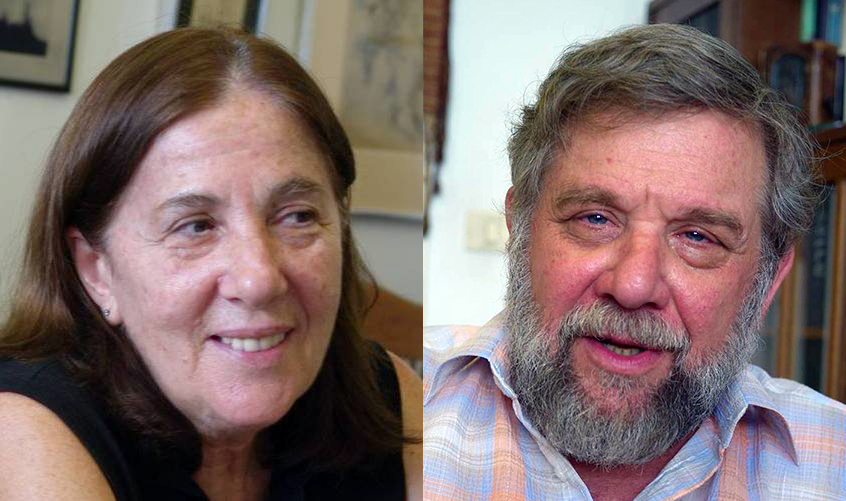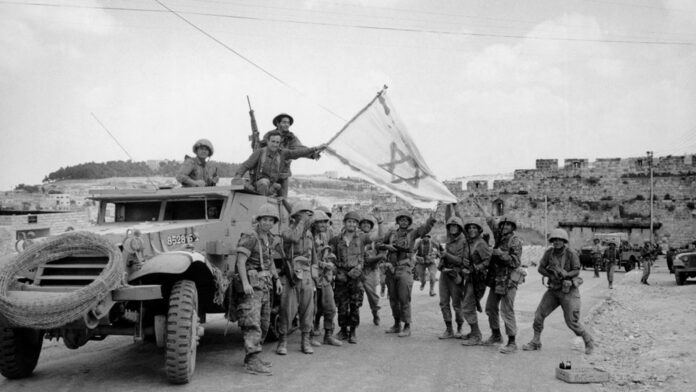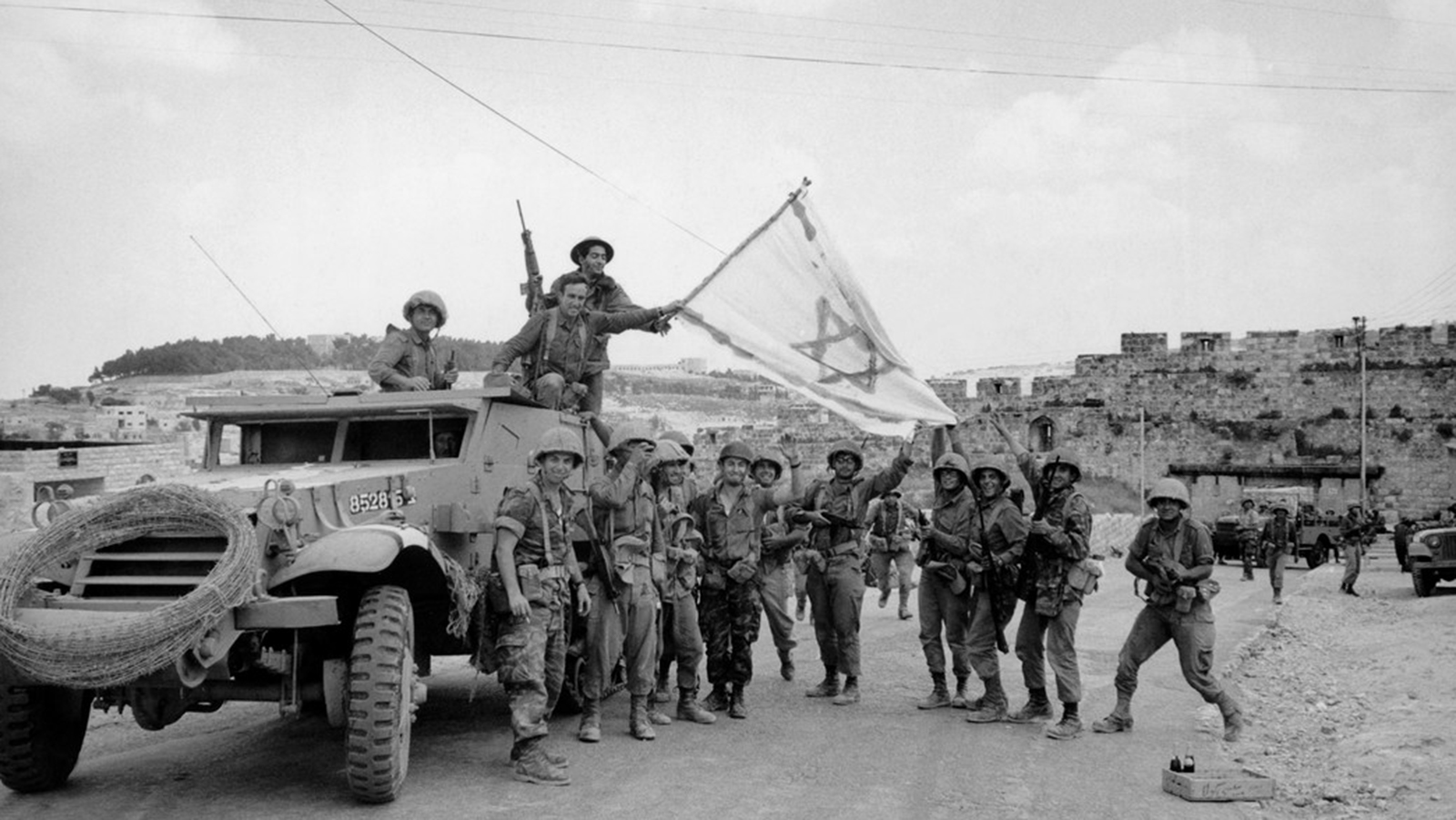The Six Day War (5-11 June 1967) won by Israel against a coalition of Arab countries – and leading to the occupation of the West Bank and Gaza Strip – marked a decisive turning point in the Middle East. At the time of the new conflict between Hamas, which governs the Gaza Strip, and Israel, it is useful to look back at the origin of the Six Day War and the role played by the USSR. In an interview with Desk Russia, Israeli historians Isabella Ginor and Gideon Remez also discuss Putin’s Russian policy towards Israel and the Palestinians.
Interview with Israeli historians Isabella Ginor and Gideon Remez

Isabella Ginor and Gideon Remez are journalists and experts on USSR-Israel relations. Associate researchers at the Truman Institute, part of the Hebrew University of Jerusalem, they specialize in Soviet military and intelligence history. Their most recent book: The Soviet-Israeli War, 1967-1973 (Hurst/Oxford University Press, 2017).
June 5 marks another anniversary of the Six Day War (1967). You have demonstrated in your research that the Soviet Union aimed to help the Arab countries to destroy Israel outright. Can you summarize what you have been able to establish?
In our book Foxbats over Dimona (Yale University Press, 2007), we did establish, contrary to most previous historiography, that the USSR did deliberately instigate the crisis of May 1967 that became the Six-Day War (and didn’t just blunder into it). The Soviet purpose was to inflict a defeat on Israel that would enhance the dependence of Arab countries (especially Egypt and Syria) on the USSR, and specifically would halt or destroy Israel’s nuclear project. Moscow had forced Israel to retreat from Egypt’s Sinai peninsula, which it captured in the Suez-Sinai campaign of 1956, by threatening Israel with nuclear missiles. This advantage would be lost if Israel acquired its own nuclear deterrent. The Soviets also considered a deliverable Israeli bomb a threat to the USSR’s own territory, which would close the gap in the ring of nuclear-armed Western alliances that was created when (as a result of the Cuba crisis in 1962-3) US missiles were withdrawn from Turkey.
To achieve these purposes, the Soviet Union was willing to launch a limited but significant military intervention by its own forces that (according to its estimate) would tip the balance in favor of the Arab side. This would include a naval landing on Israel’s coast and aerial bombing of strategic targets including Israel’s nuclear complex at Dimona. But since the Soviets insisted on legitimacy for this action, it would be initiated only after Israel was provoked into a first strike and was branded as the aggressor. However, the Arabs could not withstand the unexpectedly devastating effect of this preemptive air strike, and so the plan failed disastrously.
The broader purpose was to force Israel back to the impractical and indefensible borders that it was allotted under the UN Partition Plan of 1947. The USSR had recognized Israel de jure, and so was formally committed to its existence — but only within those borders. Whether, if the Soviet-Arab plan had worked, Moscow would have acquiesced in the total destruction of Israel that the Arabs declared as their goal remains an unanswerable counterfactual question.
Which of the actions of the USSR was public and which was secret?
Publicly, the Soviets charged at the UN and elsewhere that Israel was massing forces to attack Syria. The Egyptians knew this claim was false, but it provided the pretext for measures coordinated with Moscow, each of which was a casus belli for Israel: moving massive Egyptian forces into Sinai (which was demilitarized since 1956), evicting the UN peacekeeping force that was stationed there, and blocking the Straits of Tiran for Israel’s shipping to the southern port of Eilat which included its vital oil supply.
Secretly, the USSR built up its naval presence in the Mediterranean to an unprecedented level, including marine forces and nuclear submarines. It readied strategic bombers, fighter-plane squadrons and paratrooper divisions near its southern border and twice sent its most advanced, still-experimental aircraft (later known as the MiG-25 or Foxbat) on highly provocative flights over Israel’s nuclear plant.
Did the USSR have accomplices in Israel?
A warning that Israel, despite its official ambiguity, was determined to achieve nuclear weapons was transmitted to Moscow by the leader of one of two competing factions of the Israel Communist Party. One of the missions for Soviet paratroopers was to link up with “our people” — Communists and especially Israeli Arabs, who were expected to support an Egyptian-Syrian invasion. As the invasion never came, this was not put to the test.
How to explain that the Soviet leadership began releasing Jews soon after the Six Day War?
The limited emigration to Israel that was permitted before 1967 (including Isabella’s family in late 1966) was stopped after the war, but gradually renewed – among other reasons, in order to provide a channel for planting spies. This was necessary since the rupture of diplomatic relations with Israel on the last day of the war shut down the intelligence rezidentura in the Soviet Embassy and its agent network.
Another reason was the policy of Détente that the Soviet leadership pursued with the Nixon Administration from 1968 and peaked at the Moscow Summit in 1972. Israel’s victory in the Six-Day War triggered a wave of Jewish sentiment within the USSR and demands for emigration, which threatened to spread to other national minorities. Releasing the most troublesome Jewish activists both reduced this problem and was a convenient trading chip in return for US concessions, as it became a politically popular cause in America that went as far as Congressional sanctions.
If we turn to the present day, how can we explain that anti-Semitic policy has been replaced by a Philosemitic one.
We don’t agree with this assessment. There are increasingly nasty expressions from Russian politicians, including spokesmen of Putin’s party, and this is likely to worsen as domestic resentment builds up.
Why is the Russian government so actively talking about the Holocaust? Now they even have a new theory – the Nazis wanted two Holocaust: Jewish and Slavic (Russian).
This is part of a campaign to regain control of the former Warsaw Pact countries such as Poland by portraying their present governments as heirs to fascist and pro-Nazi regimes.
Roughly speaking, does Putin really think that “world Jewry” will be on his side and this will allow him to realize his plans to restore the USSR?
We doubt it. “World Jewry” and its supposed power are an anti-Semitic canard that can be useful for incitement but can make little difference for Putin’s practical strategy, and he is smart enough to know it. Manipulating Trump, and to some extent Netanyahu also, to legitimize Putin’s claims, has been much more useful. But Netanyahu is not “world Jewry” and he certainly has lost ground especially among US Jews.
At the same time, today the war with Hamas shows that Philosemitic politics has its limits. Unlike the rest of the West, Russia does not regard Hamas or Hezbollah as terrorist organizations. Unlike the United States, Russia is friendly with Iran, Israel’s sworn enemy. Russia in international instances supports Palestine, not Israel. Why is Israel not responding to this?
Good question, which we have been asking for years. Whenever Israeli leaders, from Sharon on, were in trouble with US administrations (especially on the Palestinian issue), they flew to Moscow, cozied up to Putin and pretended that Israel has an alternative Russian option – which we don’t think it has. In the present crisis, Moscow has kept relatively quiet and appears to be hedging its bets between its longtime proteges Fatah and the Palestinian Authority, on one hand, and Hamas — whose control of Gaza it was the first to recognize — on the other. Sooner or later developments on the ground may force Putin’s hand, but so far he has managed to play both sides of the street.
To what extent do Russian/Russian-speaking Jews in Israel support Putin?
It’s very hard to generalize about more than a million of these people, most of whom (especially the younger, Israeli-born or raised generations) have become integrated in Israeli-Jewish society. They possibly have a slightly rightward tendency, but parties specifically aimed at them as a base are in decline except in matters of religion-and-state which affect the personal status of many. There is a distinct but small group that still identifies more, or at least as much, Russian than Israeli. They vote in Russian elections and largely back Putin like other Russian nationalists. They count for nothing in the Russian electorate and little in the Israeli one – certainly not a factor in Putin’s calculations. But as we have been warning for years, whether most “Russians” in Israel want it or not, he may use them as a pretext to intervene here “for their protection” as he has done in Georgia, Crimea, Donbass, and maybe the Baltics next.
Born in Moscow, she has been living in France since 1984. After 25 years of working at RFI, she now devotes herself to writing. Her latest works include: Le Régiment immortel. La Guerre sacrée de Poutine, Premier Parallèle 2019; Traverser Tchernobyl Premier Parallèle, 2016.




